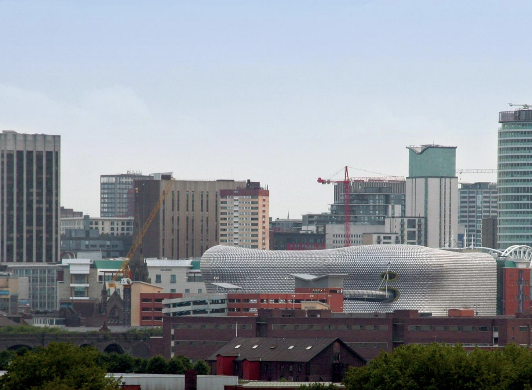The cookie settings on this website are set to ‘allow all cookies’ to give you the very best experience. If you continue without changing these settings, you consent to this – but if you want, you can change your settings at any time at the bottom of this page on our privacy page.
A Guide to Business in Birmingham
Introduction
Outside of London, Birmingham is the UK's second largest market for doing business, with a thriving manufacturing industry and growing service and tourism sector.
The much publicised HS2 rail project, which will unite the area with London, is likely to stimulate further investment, making the city one of the most commercially attractive cities in Europe.
Significant investment from home and abroad should help to alleviate the city's unemployment problem in the coming years, making Birmingham a European hub for international business.
The city is regarded as the 18th best city in Europe in which to locate a business (1), providing access to over 100,000 graduates, with competitive advantage in areas like automotive and aerospace research.
There are lots of different types of business spaces available to let in Birmingham - varying from office space, to warehouse, light industrial and more.
Key commercial property trends
With the development of the HS2 rail project, Birmingham is bracing itself for a boom in commercial property demand, with multi-national firms encouraged to use the city as their primary British base.
- While demand has slowed down following the financial crisis, the office, industrial and retail sectors are expected to exceed the rest of the UK average until 2015:
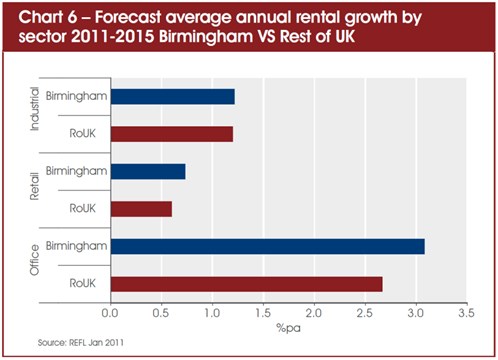
Source: GVA Regional Cities Seminar: Invest in Birmingham/IPD REFL Jan 2011
- Speculative developments like the city centre Paradise Circus project are likely to be completed, offering new Grade-A office plots, along with retail space, hotel and entertainment facilities. Other new developments like Five Brindley Place and 2 Snowhill have modernised the city centre with top-quality office space.
- Demand for industrial space in the city has been increasing rapidly recently as a result of a boom in the e-commerce market, with Birmingham's first-class distribution access to the rest of the country creating a rise in demand for purpose-built warehouses (10).
Industry overview
Birmingham is the largest industrial market in the country, with a thriving manufacturing and engineering centre employing over 100,000 people.
Over a quarter of the UK's skilled advanced engineering workers are located in the city, with particular areas of engineering expertise including electromechanical, hydraulic, pneumatic, electronic and electrical components. With access to five Universities and another 15 within an hour's commute, the city is supplied with a steady stream of bright and skilled engineering graduates.
A thriving culture for engineering research is driven primarily by The University of Birmingham, Aston University's Photonics Research & Consultancy and Warwick's National Automotive Innovation Campus. Following the decline of the manufacturing sector in the 1970s, Birmingham has since diversified, building further capabilities in professional services, retailing and tourism.
Birmingham also has a thriving jewellery quarter, manufacturing 40% of all the jewellery made in the UK (4).
This graph higlights Birmingham business sectors.
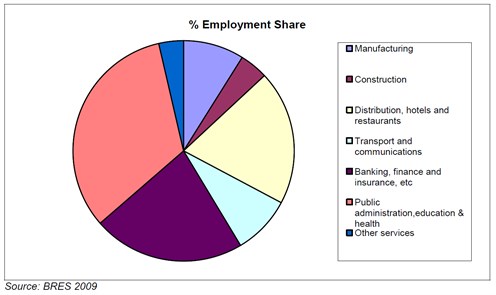
Source: birmingham.giv.uk/economy Local Economic Assessment
Aerospace
The Midlands area is the hub of the UK's aerospace output, with Birmingham providing cutting edge research, metals and composite parts.
With around 300 specialist companies and over 40,000 employees, Birmingham is a major contributor to the UK having the second largest aerospace output in the world (12). The quantity of quality aerospace technologies also means that the UK is poised to take advantage of an increase in demand for air travel by being able to supply products from companies with a strong reputation. This is likely to lead to continued increases in employment in Birmingham in the aerospace sector.
The city is also home to the High Temperate Research Centre, a collaborative £60m project between the University of Birmingham and Rolls-Royce, which aims to build greener, more efficient Aerospace engines.
A cluster of firms include KN and Goodrich, Thyssen Krupp Aerospace and Aero Engine Controls, who provide capability in areas like electro-mechanical systems to control aircraft moving parts. Many firms are based in central areas like the Redfern Road industrial estate and around Grand Union Canal.
These statistics from March 2013 show the importance of the aerospace industry within the UK along with the business sectors forecast growth potential.

Source: gov.uk/goverment/news/uk-aerospace-industry-receives-2-billion-investment
Automotive
Birmingham currently generates 60 per cent of the UK's automotive research and development (11) and is home to 1,400 automotive businesses including JCB, Aston Martin, Toyota, Honda, MG Motor and Jaguar Land Rover.
The city's network of suppliers covers all aspects of the automotive supply chain, including metal pressings, electronics and automotive plastics.
Recent data from 2013 has shown a resurgence in the automotive industry, after a period of decline. Jaguar Land Rover reported record car sales figures for 2013, which has led to the need for 2,000 more employees (13). This is just one sign that the automotive industry in Birmingham still has a lot to offer and will continue to remain a strong factor in the city's business portfolio.
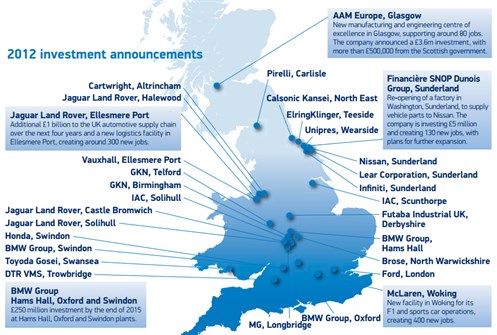
Source: smmt.co.uk/wp-content/uploads/sites/2/SMMT-2013-Motor-Industry-Facts-guide.pdf
This map illustrates the quantity of investments made in 2012, clearly showing Birmingham as a popular automotive area.
- The Government's new Advanced Propulsion Centre may also be housed in Birmingham, which could make the UK a leading global player of ultra-low carbon vehicle technology.
- Popular areas for manufacturing firms include Fort Dunlop on the North East of the city, the nearby Midpoint Park or Longbridge.
Food and drink
Birmingham has a vast food and drink manufacturing sector, providing 59,000 jobs and £14bn of income (2). The area has particular expertise in confectionery, drinks and food technology and is home to large firms like Muller Dairies, Kraft/Cadbury and Coors.
The region is also home to a range of specialist F&D networks, including Heart of England Fine Foods (HEFF) and the Regional Food Academy.
The University of Birmingham and Birmingham College of Food have particular expertise in food, providing a wealth of research and expertise. The University College Birmingham often works in conjunction with local food businesses, giving students the chance of work placements or helping to develop new food products and recipes. The college's Food Innovation Facility is regularly used by small/medium businesses for product and recipe development, taking advantage of a full range kitchen with commercial scale equipment (14).
Professional
Birmingham has the second largest number of business and financial services graduates outside of London, with the industry generating £23bn of revenue for the region (2).
The city has particular skills in accountancy investments, retail and specialist banking services and finance, with firms like Deutsche Bank, KPMG, E&Y and PwC. The area is also a thriving hub for insurance and legal services, employing over 10,000 insurance professionals. The most popular region for professional services firms is a cluster around Birmingham's city centre and on its western edge, including Colmore Business District, Brindleyplace and Edgbaston.
Birmingham is also an international hub for language skills, with the highest frequency of foreign languages spoken of any city in the UK (1), creating a prime environment for global business.
This chart shows the proportion of employment in knowledge intensive industries for Birmingham, compared to the West Midlands and the UK.

Source: birmingham.gov.uk/economy Local Economic Assessment
Information technology and media
Birmingham has a growing IT and creative media sector, accounting for £2bn GVA (Gross Value Added) (2), the second-largest growth of all cities in the UK.
The region is widely renowned for being a 'hotspot' for digital and e-commerce businesses, with over 1,000 businesses contributing over £18m to the local economy (7).
- A £25m Digital Media Academy is a hub of regional knowledge and innovation, supporting leading players in the region including BBC, Codemasters, Blitz, Sega and CentreSoft.
- Demand for commercial office space from the Telecoms, Media and Technology sector is growing quickly and is said to have accounted for 12% of leasing activity in Birmingham in 2012 (compared to 5% over the last 5 years) (3).
- Birmingham Science Park, located on a site adjacent to Aston University and Eastside area, is a particular hub for technology firms, with other clusters at Fazeley Studios, the Custard Factory and the Jewellery Quarter.
This graph shows the popular business sectors in Birmingham.
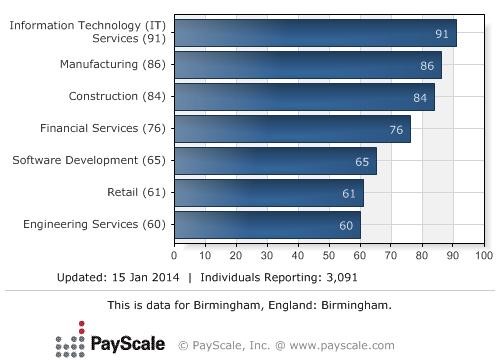
Source: payscale.com/research/UK/City%3DBirmingham/Tallies
Tourism and retail
Birmingham is one of Europe's biggest conference and event destinations with a tourism industry worth £4.9bn (2). Major facilities include the International Convention Centre, the National Exhibition Centre (NEC) and the Symphony Hall, bringing 42 per cent of all UK conference and exhibition trade.
Birmingham's retail sector makes up a large proportion of the city's economy, featuring one of the largest shopping centres in the UK, the Bullring, and is the second most visited retail destination outside of London. Other high value retail space can be found in Martineau Place, The Square and The Pavilions, although excellent-value retail space can be found on the outskirts of the city centre in areas like Balsall Heath.
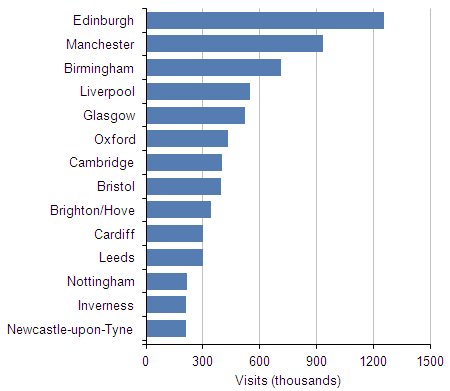
Source: ons/gov.uk/ons/resources Travel Trends, 2012 - ONS
Economic growth and employment
- Birmingham is the second-largest city economy in the UK, with the West Midlands area producing over 2 percent of the UK's GVA (6).
- In 2008, the European Cities Entrepreneurship Ranking report, with covers economic, infrastructure and quality of life factors, placed Birmingham above London, Berlin, Madrid, Paris and Rome.
- In 2010, Birmingham was ranked as the 52nd-most liveable city in the world and the second most liveable in the UK, according to the Mercer Index of worldwide standards of living.
- In 2012 the the city was 7th in Europe in the fDi Intelligence 'Cities and Regions of the Future; poll; it was also the only English city in the top 10 of the Large European Cities category.
Birmingham suffers from one of the highest unemployment rates in England; unemployment rates since the start of the millennium have been around double the national average, currently sitting at 9.8% (vs 4.2% national average and 5.4% West Midlands) (5). The Government is currently working on a number of initiatives to reduce the levels of unemployment in the city and a wealth of new foreign direct investment should stimulate job creation.
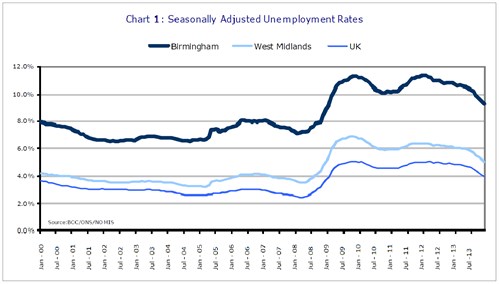
Source: birmingham.gov.uk/birmingham-economy Unemployment Briefing - December 2013
Infrastructure and environment
As a result of Birmingham's unique geograph at the centre of the UK's road and rail netword, 98 percent of UK consumers are within 4 hours travel time of the city (8).
- Birmingham International Aiport has 50 airlines serving over 140 routes worldwide, with plans for a £200m expansion, making international business easier.
- The HS2 rail project, due for completion in 2026, will make the city accessible to London in less than 45 minutes, encouraging international businesses to set up their headquarters there.
- The Big City Plan with see £18bn worth of government investment towards a regeneration project by 2026, which will see £1.3bn spent on road, rail and air networks.
- A £600m redevelopment of New Street Station, £130m Metro investment and £13m investment in the city bus interchange should also result in further improvements in local transport services (2).
- The city is already ahead of its target to reduce CO2 output by 2026, receiving an additional £40m of government investment for research and development.
Overall it is clear that Birmingham is a great place to set up and do business, with access
to a large consumer market, a first-class transport network and flourishing secondary and
tertiary industries.
If you would like to know more about how Pall Mall Estates can help with your commercial property needs, call us today on 020 8986 7221 to speak to one of our experts.
Pall Mall Estates - Helping you move with our low cost, high value, business space to let throughout the UK.
Pall Mall Estates have a wide range of low-cost commercial properties across the UK.
Take a look at our available spaces here or get in touch with our experienced team here.
References
1. http://www.berlin-partner.de/fileadmin/chefredaktion/pdf/studien-rankings/ 2011_en_European-Cities-Monitor.pdf
2. http://businessbirmingham.com/birmingham-is-ready/for-business/sectors/
3. http://www.propertyweek.com/Journals/2013/05/02/e/w/g/Birmingham-Office-Market-Spotlight ---May-2013---PW.PDF
4. http://www.jewelleryquarter.net/event/made-in-the-jewellery-quarter-day-school/
5. Birmingham City Council Unemployment Briefing
6. https://www.uktradeinfo.com/Statistics/RTS/Pages/default.aspx
7. http://www.digitalbirmingham.co.uk/downloads/Birmingham%20-%20A%20Digital%20City.pdf
8. The Full Birmingham Story, Birmingham City Council (2012)
9. GVA Regional Cities Seminar: Invest in Birmingham/IPD REFL Jan 2011
10. Global Perspective On Retail: Online Retailing, Cushman & Wakefield
11. The automotive cluster in the West Midlands, UK
13. http://www.bbc.co.uk/news/business-25701389
14. https://www.ucb.ac.uk/study/facilities/food-science-and-innovation-suite/



